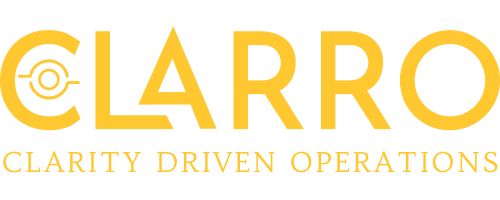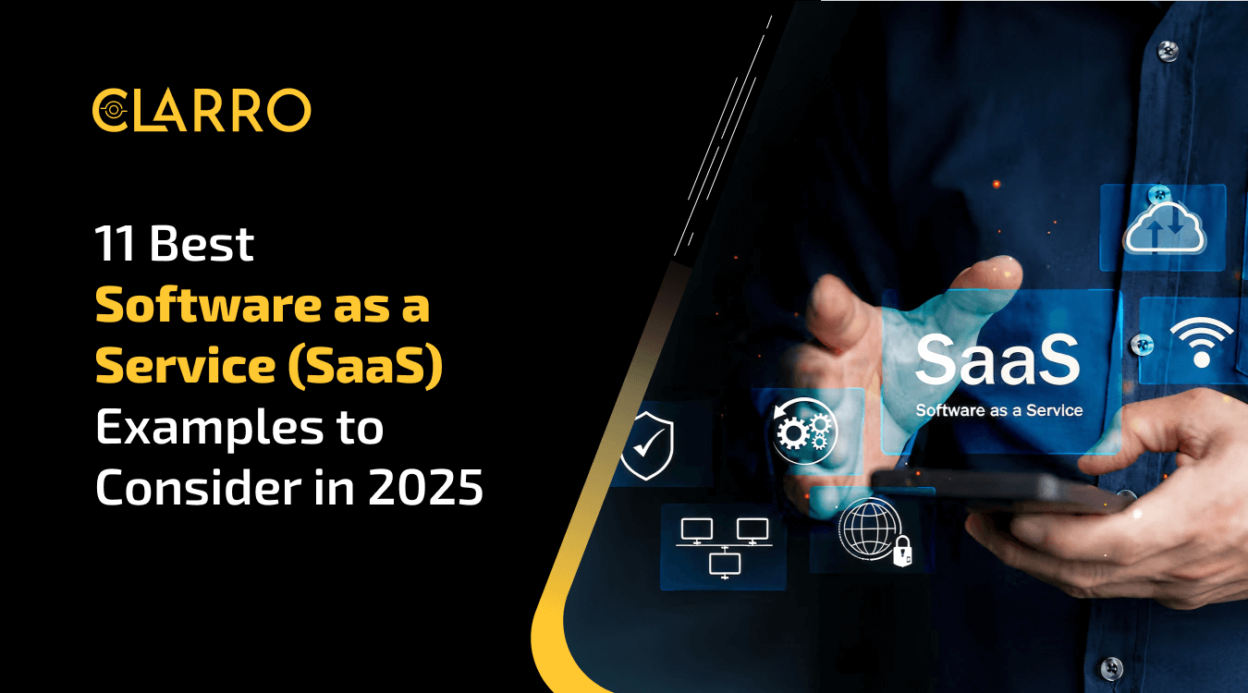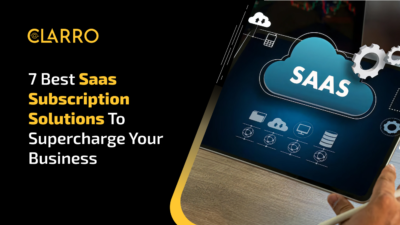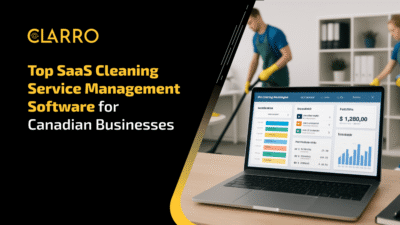Quick summary: The rapid rise in SaaS product utilization has been experienced in the last decade and is expected to continue in the years to come. Here are the SaaS products that businesses will embrace at scale.
There’s a reason you’re hearing about new SaaS businesses everywhere you go. As a business model, Software as a Service is objectively one of the most profitable and scalable options out there. The SaaS market is absolutely booming as thousands of SaaS companies thrive globally. In fact, experts anticipate that by the end of 2024, 99% of companies worldwide will be using a SaaS product.
As the world goes online, digital transformation picked up the pace with SaaS products, that is one of the primary tiers of cloud computing as it redirects resources away from hardware and software. The unique capability increases the SaaS market size from $250 billion in 2025 to reach $299 billion by 2029.
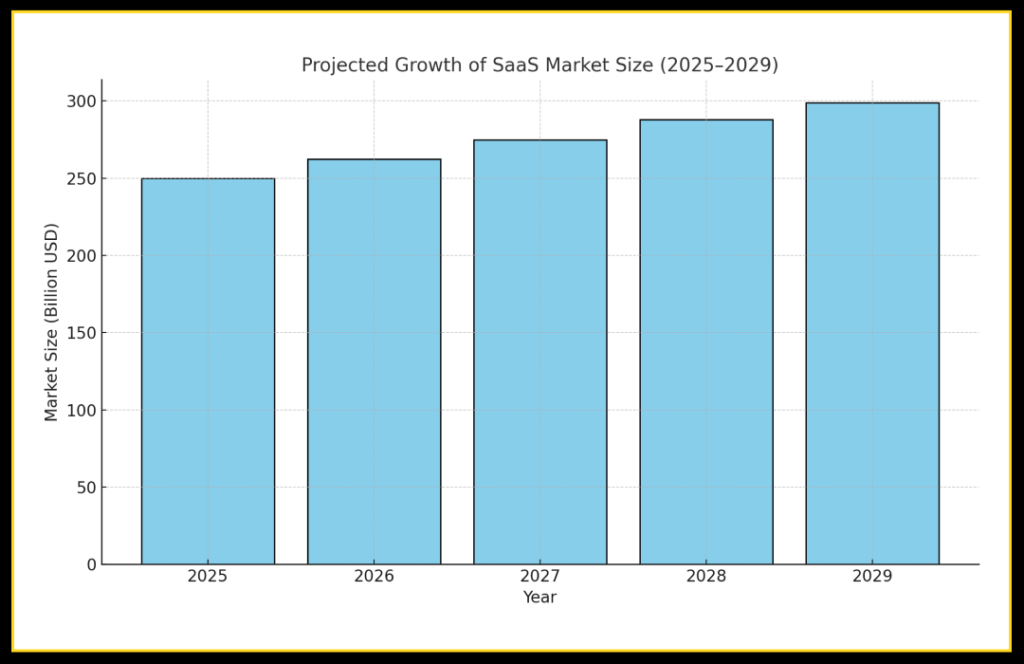
The growing SaaS spending indicates that it’s a future for start-ups, SMBs, and large enterprises. It’s followed by the search for the best SaaS (software-as-a-service) that meets the digital needs of the businesses. This blog will shed light on the best SaaS software for businesses in 2025 that helps them shine all through the way.
11 best software-as-a-service apps that businesses use
SaaS apps- the cost-effective alternative to traditional software is a bespoke solution that eliminates installation, data storage, maintenance, and regular updates headaches. Take a look at the SaaS apps making things easier.
1) Clarro: SaaS business management & automation software
Clarro is one of the best SaaS software for businesses in 2025 as it’s an all-in-one business service optimization hub, allowing various businesses to seamlessly manage their services and optimize operations using plenty of SaaS tools. The affordable SaaS solutions in Canada cover every need of businesses, from automated scheduling and resources management to intelligent reports and analytics.
The large ecosystem of SaaS tools helps businesses with service management, business coordination, back-office administration, marketing automation, and integrated payment solutions. Different businesses of various industry verticals, such as sports & fitness, education, healthcare, entertainment services, and transportation, are served.
2) Slack: bring your people, projects, and apps together
Slack is one of the top SaaS productivity tools for teams, mainly used in the business workspace to connect employees. With instant connection, Slack allows team members to collaborate and manage the project seamlessly, reducing email clutter. Founded in 2013, the SaaS app connects 4 million users with 700 million daily messages.
More than just a chat tool, Slack acts as your team’s virtual office, replacing endless email threads with organized channels where discussions, project updates, and files live side-by-side. Its instant messaging and integrations with key apps help teams solve problems quickly and keep information flowing—making it ideal for fast-moving, highly collaborative environments.
Businesses can try the free version of the Slack to experience its functionalities and then start with a premium subscription plan offering different functionalities for the app.
3) Salesforce: software-as-a-service provider
Salesforce is a well-renowned #1 cloud-based SaaS solution that enhances CRM systems and improves the efficiency and effectiveness of the sales and marketing teams. Under the Salesforce SaaS ecosystem, sales cloud, service cloud, marketing cloud, and commerce cloud products are provided that enhance lead management, improve collaboration, refine marketing automation, better data management, and help with advanced contact management.
All of your customer data is in one place, accessible from anywhere to support the entire life cycle of a sale. Used by sales reps, customer support, and marketing teams alike, Salesforce offers a comprehensive view of customers and prospects, helping businesses prioritize conversions and customer satisfaction.
Avail of the low setup and infrastructure cost, scalability, high accessibility, and auto-updates with salesforce products and the highest security assured in the same vein.
4) Asana: manage your team’s work, project, and tasks online
The project management tool uses AI to allow teams to manage the work and goals with excellent coordination. 85% of the Fortune 100 companies use Asana to keep the work moving for product launches, resource planning, employee onboarding, creative production, and market campaign management.
Asana’s platform promotes collaboration between team members, allowing customised permissions and assigned tasks. It’s designed to divide responsibilities, manage deadlines, and keep everyone aligned—ideal for managing both small projects and large-scale company initiatives.
The app improves clarity and accountability by connecting goals with the team, and AI handles contextual tasks with 300+ integrations. One of the enterprise SaaS platforms for scaling needs is an ideal solution for large organizations.
5) Monday.com: simplify the way your team works
The rapidly growing SaaS company helps manage workload, enhance team communication, and let businesses celebrate success. The project management software enables businesses to bid goodbye to spreadsheets with a custom platform that organizes tasks and engineers time-driven environment. The platform, launched in 2014, offers free and paid plans to meet the needs of a wide range of businesses. Custom data organization and simplified onboarding ensure a streamlined workflow.
Monday.com transforms the old spreadsheet experience into an interactive, customizable workspace. It’s perfect for customer relationship management, meeting deadlines, and tracking progress—all in one visually engaging dashboard.
6) Dropbox: collaborate and deliver work faster.
The all-in-one solution allows businesses to store content, edit PDFs, share videos, sign documents, and review actions that help make collaborating on any project easier. More than 500,000 teams use Dropbox across different countries, time zones, and offices to get organized and work smoothly. In SaaS vs. on-premise software comparison, the SaaS platform stands out as a Dropbox support business at every business stage, from file storage and protection to content sharing and collaboration.
Dropbox is engineered for secure file sharing and large file transfers, giving teams the power to collaborate in real-time without waiting on lengthy downloads or risking data security.
7) Mailchimp: marketing, automation, and email platform
The cloud-based business software reviews state that MailChimp is the best SaaS software for businesses in 2025 that turns email into revenue. The platform improves conversion with email automation, creates emails faster with generative AI, refines targeting with segmentation, and optimizes email marketing with reporting and analytics—the 11 million users of Mailchimp experienced ROI growth of 25 times with 31 billion AI-generated emails. With different plans and 300+ integrations, businesses experienced outstanding results.
Mailchimp’s premise is simple: success starts with reaching the right audience. Its sophisticated automation and analytics allow you to craft fully personalized marketing campaigns, making it a go-to for companies looking to deliver the right message at the right time.
8) Shopify: The all-in-one Ecommerce platform
One of the best SaaS software for businesses in 2025 who are dreaming big and looking to build faster with Ecommerce store development. The Ecommerce platform is behind everything, whether you want to sell online and in-person, locally and globally, on desktop and mobile, or sell direct and wholesale.
Shopify provides the technology and secure interface to run your online store efficiently, promoting scalability and peace of mind when handling customer data. With options for building from scratch or using pre-built templates, Shopify supports merchants of every size—fueling $1,000,000,000,000 in sales and reaching 150 million buy-ready shoppers around the world.
9) Zoom: one platform to connect
The SaaS app has been around for more than a decade, but the pandemic has increased its popularity by a million times with the ability to connect family, friends, and employees virtually. Zoom features webinar hosting, screen sharing, real-time transcription, and virtual background during both audio and video conferencing.
Whether you’re running a global team meeting or hosting a virtual family reunion, Zoom’s robust platform supports large-scale video and audio conferencing with ease. With the latest AI companion 2.0, productivity and engagement are elevated to a new level, spanning industries from education and healthcare to finance and retail.
10) Canva: the tools behind the great design
Launched in 2013, Canva is an online design and visual communication tool used by 220 million users worldwide across 190 countries to create 30 billion designs. With the ability to design anything and publish anywhere, designing graphics for marketing campaigns has become a breeze. The SaaS platform facilitates brand customization and photo editing in the pre-built templates provided for different categories, helping businesses create and share professional designs. AI-driven Magic Studio helps generate the design in brand voice and edits them as required.
Canva’s intuitive drag-and-drop platform brings professional-level design to everyone—from social media campaigns to business presentations and even personal invitations—making creativity accessible to all.
11) Microsoft Azure: cloud computing service
The limitless innovation with the SaaS platform enables businesses to build transformative AI applications. Azure is a pay-as-you-go SaaS solution that requires no upfront commitment and businesses can try it free for 30 days. It brings infrastructure to business apps for building AI solutions, cloud migration, data transformation, and AI integration. The secure platform, founded in 2010, provides a range of tools (More than 200) that bring the vision to life and was named a leader by Gartner in 2025.
Microsoft Azure is the backbone for entrepreneurs and enterprises building scalable apps, offering a secure cloud environment for development, storage, and advanced analytics.
Conclusion
In the digital landscape, SaaS solutions are making waves in the IT industry. They help businesses grow with improved team collaboration, productivity, and support. Top 11 SaaS solutions help businesses to grow and achieve their goals faster. However, informed decisions for the SaaS platform are essential to manage the work better.
So businesses should identify the business requirements for the SaaS platform, look at the functionalities provided by the SaaS platform, verify security and compliance, evaluate performance and reliability, and check the customer support to choose the right SaaS solution for business needs. Post-selection, implement the SaaS solutions so as not to get left behind without overpaying for the future.

FAQ
1) What is SaaS?
SaaS is a software as a service application that is hosted on the cloud and accessed through an internet connection. Typically, businesses pay for the SaaS services based on a subscription model rather than paying a fixed amount.
2) What are the benefits of using a SaaS solution?
SaaS solutions benefit businesses for various reasons, including no installation required, scalable pricing based on app usage, remote accessibility, high collaboration, and auto-updates.
3) Who uses SaaS solutions?
SaaS solutions are used by individuals and a range of businesses, from start-ups and SMBs to large enterprises. Different platforms are used for various services they offer, including Salesforce for CRM, Shopify for Ecommerce, etc.
4) Can SaaS solutions integrate?
Yes, almost all the SaaS solutions enable seamless integration with other platforms using APIs. For example, Trello integrates with Slack, facilitating seamless project management with instant communication.
5) Are SaaS solutions secure to use?
Yes, SaaS solutions are secure to leverage because they offer data encryption, provide regular backups, enable role-based access, and compliance with regulations.
6) How do cloud-based SaaS products address issues such as security, onboarding, and accessibility?
Cloud-based SaaS products address key business challenges by combining strong security, simple onboarding, and universal accessibility. They use data encryption, automated backups, and role-based access controls to protect sensitive information. Onboarding is streamlined through intuitive dashboards and guided setup, allowing users to get started quickly without complex installations. Since SaaS platforms are cloud-hosted, teams can securely access applications from anywhere, enabling remote work and real-time collaboration.
7) How does SaaS differ from other cloud-based business models like PaaS and IaaS?
SaaS delivers ready-to-use software applications that users can access online without managing infrastructure or updates. In contrast, PaaS provides development platforms for building and deploying custom applications, while IaaS offers raw computing resources such as servers and storage. SaaS is best for simplicity and speed, PaaS suits application development, and IaaS is ideal for businesses needing full infrastructure control.
